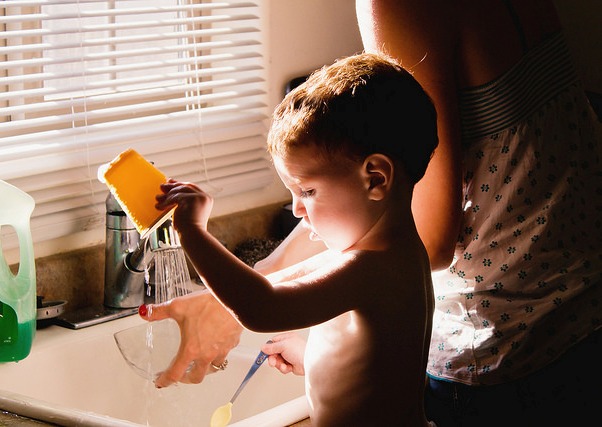I’m washing dishes in a white plastic tub in the kitchen sink.
I am not a big fan of plastic. Never mind that it lingers around to junk up the planet forever, the aesthete in me simply finds it cheap and unappealing. I prefer things that are handmade, elemental, and have some semblance of character or charm. Soul, even. Plastic doesn’t warm my heart, and I’ve long since banished it from my house wherever I can. So it’s unusual that a flimsy, generic tub sits in my sink day after day.
California is entering its fourth consecutive year of drought, the worst in recorded history.
In an effort to reduce my water use, along with brief showers, not letting the faucet run when I brush my teeth or shave, and only flushing the toilet when necessary, I decided that one of the simple things I can do is wash my dishes in a tub and then pour the “grey water” onto the deck and garden plants outdoors. (Yes, I use an earth-friendly, biodegradable dish soap.)
Standing at the sink, washing my favorite, handmade ceramic tea cup, I recall years ago reading The Miracle of Mindfulness, by Thich Naht Hahn, the celebrated Vietnamese monk and teacher. That was the first time I encountered his famous teaching of “washing the dishes to wash the dishes,” an everyday practice in being present.
Often when I’m alone I find myself in a quiet meditation with hands, sponge, warm sudsy water, cutlery and crockery. Breathing in, breathing out. Belly soft. Shoulders relaxed.
Taking things one step further, what if washing the dishes became a simple gesture of conscious relationship with place—being mindful not only of the actual process of washing but also of the water being used. I can use less, and then share it with the plants with whom I share this thirsty patch of earth.
Imagine if just one person in 20—or 100—washed their dishes modestly in a tub and recycled the water. California could conserve uncountable millions of gallons.
I once lived in a rustic but charming house on the lush, windward side of the Big Island of Hawaii, where our water supply came from a large concrete catchment tank in the yard. It was open at the top (covered with nylon mesh) to catch the rain, and the gutters along the roof eaves drained into it as well. Between the tank and the house, the water went through a multistage filtering system. Normally rainfall was abundant but during occasional dry periods the catchment’s level dropped low, and we learned to always be prudent with our usage.
One day while visiting the mainland, over cups of green tea, I shared with a friend about our eco-friendly catchment system. She set down her cup with a perplexed look.
“What do you mean your water comes from rain?”
I explained it again—precipitation, tank, filter. She was dumbfounded. Confused. Vaguely repulsed.
“Just where do you think your water comes from?” I asked, smiling.
“Well, from the faucet.”
Right. She had honestly never considered her water supply beyond that. The fact that this precious resource flows directly into our homes, clean and more or less ready to drink (I prefer mine filtered, thank you), is a minor miracle that most people simply take for granted. Never mind where it comes from or goes. It’s sort of like our overly wasteful packaging and rubbish, all carted away somewhere pleasantly out of sight and mind, but steadily filling up the landfills and our environment.
Little is more insidious than the thought, my actions as an individual don’t matter in the larger scheme. Nothing could be further from the truth. The way that change comes to the world is through a slowly building wave of countless, individual actions.
Wendell Berry—an acclaimed essayist, novelist, poet and gentle activist who has consciously farmed a hillside in Kentucky for more than four decades—wrote in his brilliant collection of essays, Bringing It to the Table: On Farming and Food, that eating is an “agricultural act.” Berry was an early and eloquent voice telling us that what we eat matters, not only in reforming America’s food system but also in our intimate relationship with place and each other.
What we eat and how we live matters. Hugely. Our choices have consequence not only to our own health, well being, and sense of soul, but also in our relationship as a species to this planet of which we are an integral (and hugely influential) part.
So too with washing the dishes.
More than being mindful, responsible or even political, washing my dishes in the ugly plastic tub is a quiet gesture of conscious relationship with the place I dwell. It offers a chance to step outside and feel the earth beneath my bare feet—sole and soul meeting soil—and offer some life-giving nourishment to the blossoming camellias, the pots of fragrant herbs and bright flowers, the spindly rose bush, the lone cherry tree. It is an action that says, you matter and I appreciate you.
Despite our anthropocentric arrogance, it is largely the plants and microbes that make our life on earth possible. Other beings have a right to be here as much as we do, and there is a gentle, soul nurturing grace to be in communion with them. As I repeatedly say in these posts and in The Bones and Breath, everything is relationship.
Washing the dishes in a tub may not be a common path to the holy, but when we open our hearts and senses to the living web that surrounds, when we are present in body and breath, even a simple action resonates with the power of the sacred. I say that a tub of dishwater is not too humble to offer to the soul of the world.
With a bit of grace and mindfulness, may we all be fed, watered, and nourished deeply down to our interconnected roots.
Relephant:
California to Run Out of Water in One Year: Water Restrictions Imposed.
Author: L. R. Heartsong
Editor: Catherine Monkman
Photo: Val/Flickr







Read 1 comment and reply